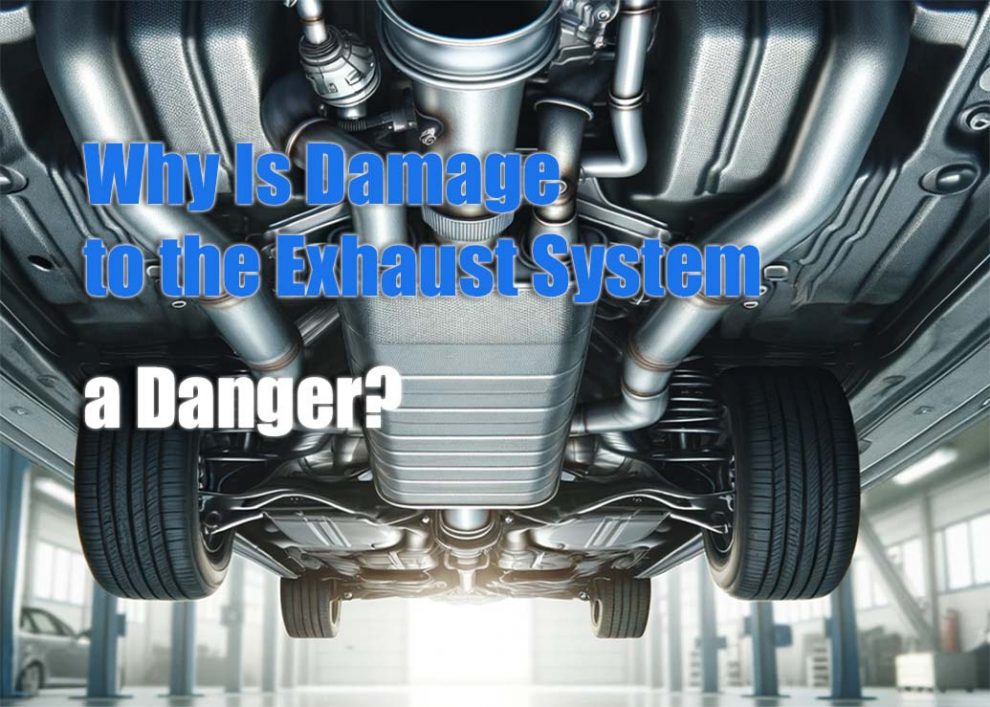Your vehicle’s exhaust system is responsible for the critical functions of expelling harmful byproducts of fuel combustion and reducing noise pollution from the engine. However, damage such as cracks, holes, or loose connections can render the exhaust system unsafe and negatively impact performance. This article will examine the potential risks posed by a faulty exhaust system and when repair or replacement is advised.
Dangers of Exhaust Leaks
Exhaust leaks present a dangerous health hazard because they enable noxious exhaust gases like carbon monoxide to permeate into the passenger cabin. Carbon monoxide is an odorless, colorless gas that can induce serious symptoms when inhaled, including dizziness, headache, nausea, and loss of consciousness. Prolonged exposure may lead to extremely hazardous carbon monoxide poisoning. Exhaust leaks near flammable materials underneath the vehicle also increase the risk of fire. Any cracked or severed exhaust components should be repaired immediately to avert these unsafe conditions for both driver and passengers.
Health Risks of Exhaust Fumes
 The exhaust expelled by the engine contains a toxic mixture of gases, including carbon monoxide, nitrogen oxides, volatile organic compounds, and particulate matter. High concentrations of these pollutants can irritate the eyes, nose, and throat, impair breathing, trigger headaches and nausea, and damage vital organs. When exhaust leaks into the passenger cabin, the air inside the vehicle becomes contaminated with these damaging compounds. Children, pregnant women, the elderly, and those with prior respiratory issues are most vulnerable to these effects. Have any leaks addressed promptly to restore cabin air quality.
The exhaust expelled by the engine contains a toxic mixture of gases, including carbon monoxide, nitrogen oxides, volatile organic compounds, and particulate matter. High concentrations of these pollutants can irritate the eyes, nose, and throat, impair breathing, trigger headaches and nausea, and damage vital organs. When exhaust leaks into the passenger cabin, the air inside the vehicle becomes contaminated with these damaging compounds. Children, pregnant women, the elderly, and those with prior respiratory issues are most vulnerable to these effects. Have any leaks addressed promptly to restore cabin air quality.
Performance Issues from Damaged Exhaust
- Reduced engine power and performance
- Loss of engine efficiency
- Improper exhaust gas flow
- Diminished fuel economy
- Failed emissions tests
Leaks lead to openings that permit exhaust gases to escape prematurely rather than exiting via the tailpipe. This hinders the exhaust system’s job of efficiently removing combustion byproducts from the engine cylinders. Restriction-free and complete exhaust flow enables the engine to more effectively draw in the air/fuel mixture for combustion. Sealing exhaust leaks maintains proper backpressure and prevents power loss.
When to Repair or Replace Your Exhaust
Watch for common signs of a faulty exhaust system like loud rumbling or roaring noises, rattling components, smell of exhaust odors in the cabin, or rusty exhaust pieces. Have any exhaust damage evaluated right away. Small leaks in pipes or gaskets can often be patched. But extensively corroded, cracked, or crushed components will require replacement. Ignoring needed repairs allows further damage from excessive heat and rattling. While replacing an entire exhaust system can be expensive, it’s far more costly to repair resulting engine damage from a severely compromised exhaust. For optimal safety and performance, address exhaust issues promptly. Also read about choosing the Best Cold Air Intake for Honda Civic models in our other article.
Conclusion
Allowing your vehicle to operate with a damaged exhaust system poses critical risks to both health, through dangerous gas leakage into the cabin, and performance, via reduced engine power and efficiency. Any loud noises, smells, or visible deterioration should be investigated promptly to nip larger problems in the bud. Conducting timely exhaust repairs or replacement ensures the safe and complete venting of engine exhaust gases. Ignore exhaust issues at your own peril – a compromised exhaust can lead to carbon monoxide poisoning or progressive engine harm. Addressing problems early on preserves safety, performance, and your wallet.


Add Comment